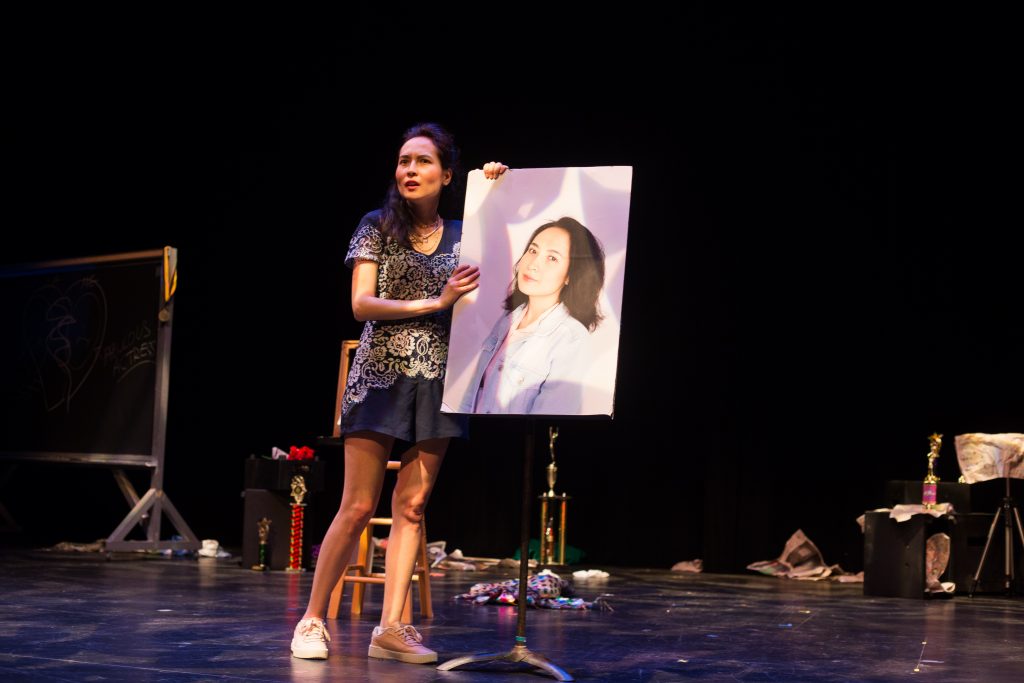Alnara Tleugazinova, a second-year graduate student studying theatre, performed her one-woman show in Binghamton University’s Studio B as part of her graduate thesis. Titled “I Used to Have a Dream,” the comedy-drama production took place from April 19-20 at 8 p.m. and April 21 at 2 p.m.
Attendees began arriving at the studio a half hour before showtime. They settled into their seats — observing the stage management team’s last-minute preparations. The curtains rose — revealing Tleugazinova struggling with the pull of a rope tied around her waist. Sensing the audience’s confusion as to where the story is headed, Tleugazinova’s character Alnara — whom she named after herself — goes back to the story’s beginning.
The space the audience sees her in is called “oblivion,” where the forgotten dreams of the dreamkeepers reside. Alnara explains that she is the dream of Medina, her dreamkeeper who longs to become an actress but doesn’t pursue her desire, as she remarks, “there are no guarantees, huh?”
While Medina — who appears over a voiceover for most of her performance — becomes a mechanical engineer in fear of becoming a failure in acting, Alnara shares her passion for the arts with the audience. A variety of trophies scattered in the background indicate just how serious she is about succeeding in acting, but she is unable to do so unless Medina pursues her calling.
Tleugazinova, who also wrote and directed the performance, shared her inspiration.
“It’s based on my life, [and] it’s based on my experience,” Tleugazinova said. “I have a completely different background that’s not tied to the arts at all. I used to be an engineer. I have several degrees in that field. I’m a mechanical engineer. The first time I arrived here and shared that information with people here, they kept asking me … ‘what made you change your mind and come here and completely change your focus?’ … I was struggling to respond to that question in a proper way.”
Tleugazinova explained that though she has always had an interest in the arts, it was more of a hobby. However, her love for the arts continued to grow throughout the years, and when she got an offer from BU, she decided it was time to explore it.
“Basically, it’s about a dream,” Tleugazinova said. “[Alnara] represents a dream of being an actress. She’s dumped in a place that’s purgatory, and she’s trapped there, and she cannot get out of there […] it’s her personal journey — what it takes of her to get out there.”
Elizabeth Mozer, Tleugazinova’s thesis advisor and an associate professor in the theatre department, elaborated on the project’s purpose.
“It’s an opportunity for a student to apply all of their learning that they’ve garnered during their time here,” Mozer said. “Not all acting graduate students make their own shows. What [Tleugazinova]’s done is double — she’s not only acting in a play, but she wrote it … She spent a lot of time in the studio alone. The purpose of it is to learn how to be self-sufficient, how to apply all the teachings, how to put them into practice, have performance opportunity [and] performance experience.”
Tleugazinova shared how she initially didn’t plan on performing a one-woman act for her graduate thesis.
“The first draft of the script consisted of several characters — I had been working on them for several months — but then we dropped that idea because this project was supposed to be about me, about my journey, rather than long conversations between several characters and trying to find out what’s going on in this play,” she said.
The stage lighting contributes to Alnara’s emotions, turning yellow-gold when she’s happy, red for something sinister and purple when she’s conflicted. Alnara invokes the audience’s sense of humor by snapping into a light dream sequence when she dances to music that starts and stops with the clap of her hands.
The entire performance is done through a series of monologues from Alnara — some of them interactive with the audience. Things come to a head when Alnara realizes that by encouraging Medina to dwell on her dreams, she is unable to live happily. Alnara settles for being just a dream instead of Medina’s reality, saying she can continue to live by making art in her “oblivion.”
Just as Alnara accepts this, a plot twist has Medina calling Alnara back as she decides to audition — making this decision the first step to chasing her dreams. Alnara dramatically voices her frustrations, earning a chorus of laughter from the audience. This brings the audience back to the opening scene where Alnara fights the pull of the rope — revealing that it was Medina calling her to come back.
After a scene change, the audience meets Medina wearing a denim jacket, black shirt and red pants. Smiling brightly, she introduces herself to the casting agent, who is intrigued by her engineering background. Medina performs a short song in Kazakh about her homeland. She is more courageous and optimistic about her dream now, and the curtains close as she concludes the production with the mantra — “there are no guarantees, huh?” — encouraging the audience to follow their dreams instead of holding onto their fears.



